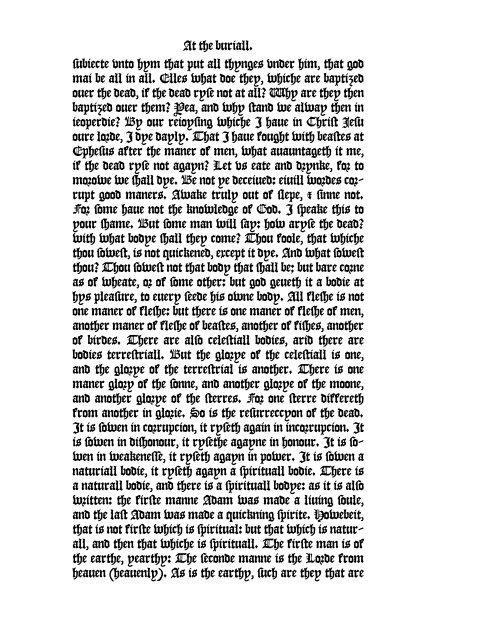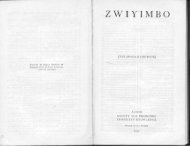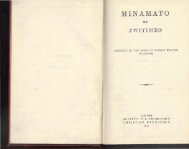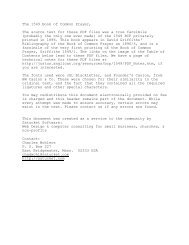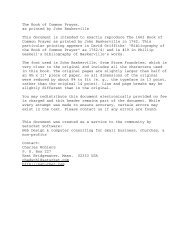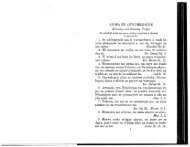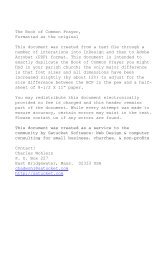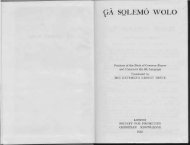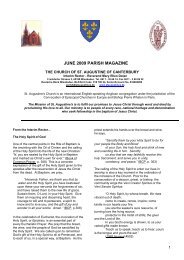The 1549 Book of Common Prayer, The source text for these PDF ...
The 1549 Book of Common Prayer, The source text for these PDF ...
The 1549 Book of Common Prayer, The source text for these PDF ...
You also want an ePaper? Increase the reach of your titles
YUMPU automatically turns print PDFs into web optimized ePapers that Google loves.
At the buriall.<br />
ƒubiecte vnto hym that put all thynges vnder him, that god<br />
mai be all in all. Elles what doe they, whiche are baptized<br />
ouer the dead, if the dead ryƒe not at all? Why are they then<br />
baptized ouer them? Yea, and why ¥and we alway then in<br />
ieoperdie? By our reioyƒing whiche I haue in Chri¥ Jeƒu<br />
oure lo°de, I dye dayly. That I haue fought with bea¥es at<br />
Epheƒus after the maner <strong>of</strong> men, what auauntageth it me,<br />
if the dead ryƒe not agayn? Let vs eate and d°ynke, fo° to<br />
mo°owe we ƒhall dye. Be not ye deceiued: eiuill wo°des co°rupt<br />
good maners. Awake truly out <strong>of</strong> ƒlepe, & ƒinne not.<br />
Fo° ƒome haue not the knowledge <strong>of</strong> God. I ƒpeake this to<br />
your ƒhame. But ƒome man will ƒay: how aryƒe the dead?<br />
with what bodye ƒhall they come? Thou foole, that whiche<br />
thou ƒowe¥, is not quickened, except it dye. And what ƒowe¥<br />
thou? Thou ƒowe¥ not that body that ƒhall be; but bare co°ne<br />
as <strong>of</strong> wheate, o° <strong>of</strong> ƒome other: but god geueth it a bodie at<br />
hys pleaƒure, to euery ƒeede his owne body. All fleƒhe is not<br />
one maner <strong>of</strong> fleƒhe: but there is one maner <strong>of</strong> fleƒhe <strong>of</strong> men,<br />
another maner <strong>of</strong> fleƒhe <strong>of</strong> bea¥es, another <strong>of</strong> fiƒhes, another<br />
<strong>of</strong> birdes. <strong>The</strong>re are alƒo cele¥iall bodies, arid there are<br />
bodies terre¥riall. But the glo°ye <strong>of</strong> the cele¥iall is one,<br />
and the glo°ye <strong>of</strong> the terre¥rial is another. <strong>The</strong>re is one<br />
maner glo°y <strong>of</strong> the ƒonne, and another glo°ye <strong>of</strong> the moone,<br />
and another glo°ye <strong>of</strong> the ¥erres. Fo° one ¥erre differeth<br />
from another in glo°ie. So is the reƒurreccyon <strong>of</strong> the dead.<br />
It is ƒowen in co°rupcion, it ryƒeth again in inco°rupcion. It<br />
is ƒowen in diƒhonour, it ryƒethe agayne in honour. It is ƒowen<br />
in weakene±e, it ryƒeth agayn in power. It is ƒowen a<br />
naturiall bodie, it ryƒeth agayn a ƒpirituall bodie. <strong>The</strong>re is<br />
a naturall bodie, and there is a ƒpirituall bodye: as it is alƒo<br />
w°itten: the fir¥e manne Adam was made a liuing ƒoule,<br />
and the la¥ Adam was made a quickning ƒpirite. Howebeit,<br />
that is not fir¥e which is ƒpiritual: but that which is naturall,<br />
and then that whiche is ƒpirituall. <strong>The</strong> fir¥e man is <strong>of</strong><br />
the earthe, yearthy: <strong>The</strong> ƒeconde manne is the Lo°de from<br />
heauen (heauenly). As is the earthy, ƒuch are they that are


